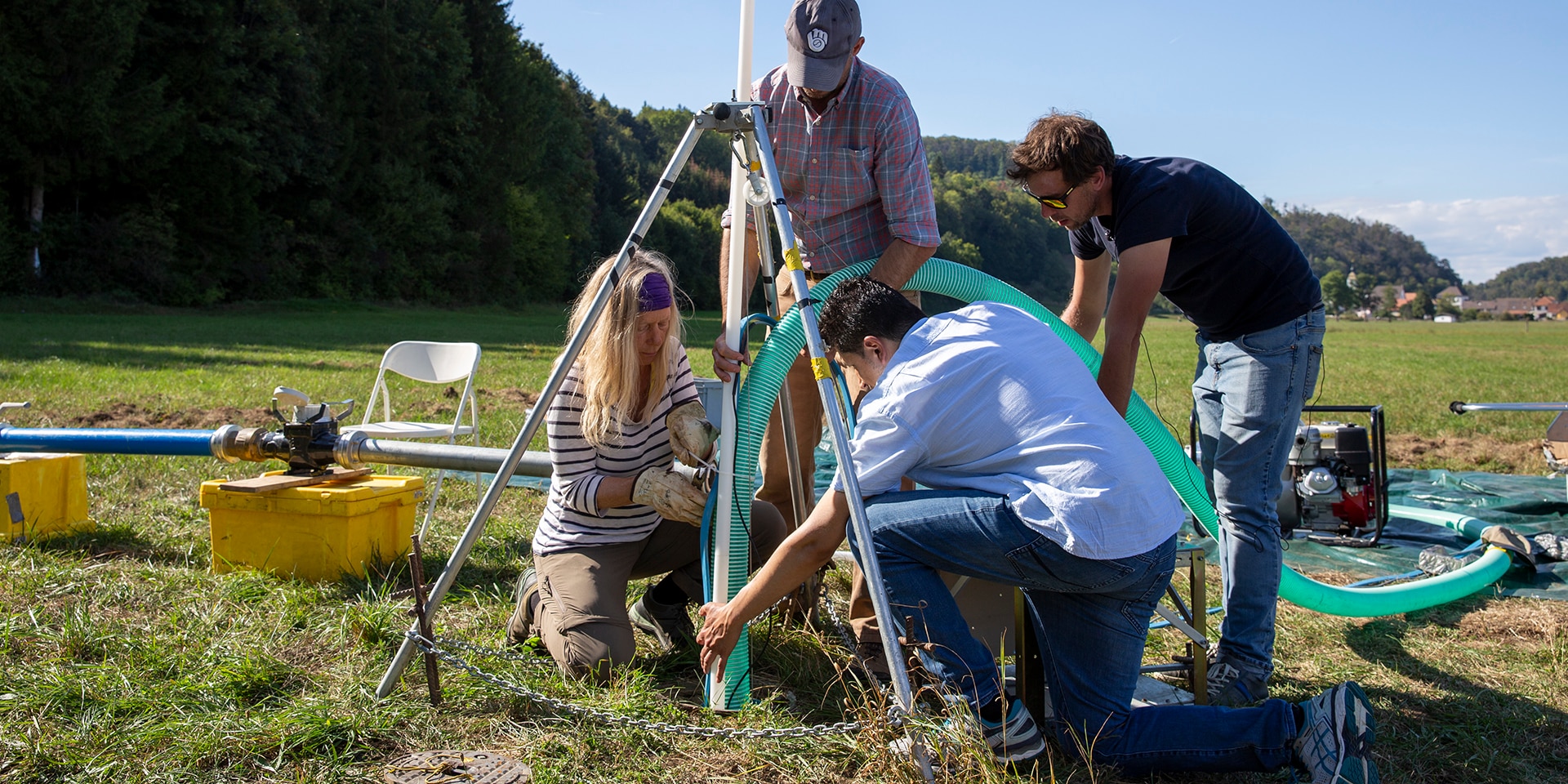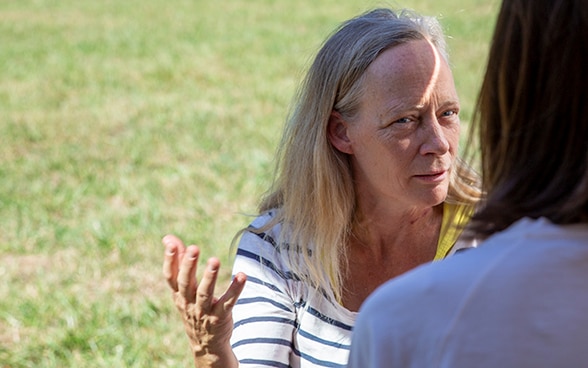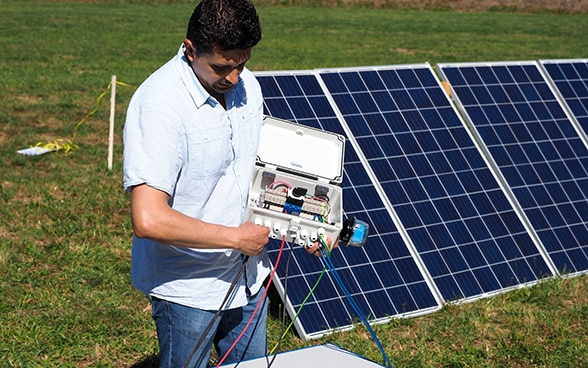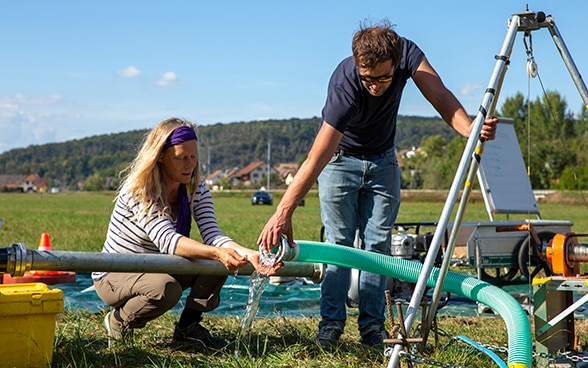Digital training worldwide with Swiss Humanitarian Aid
What's the right way to install solar panels? How can digitalisation help to bring Swiss know-how and expertise to different countries around the world? These are just some of the issues the specialists from the Swiss Humanitarian Aid Unit (SHA) are getting to grips with as part of their continuing training in Buix, in the canton of Jura. And through the use of words, images and videos they are able to reach far beyond the town limits of Buix.

The know-how of the experts assembled in Buix is shared with the population through a video project for the widespread diffusion of knowledge. © FDFA
The small village of Buix in the canton of Jura is playing host to members of the Swiss Humanitarian Aid Unit (SHA), the operational arm of Swiss Humanitarian Aid. For one whole week at the end of summer, the green fields surrounding the village are filled with engineers. All the materials – solar panels, cables, pipes, pumps etc. – are already in place. The annual training can now begin, this year with the special addition of an all-digital project.

From solar power to water – continuing training for the 21st century
The refresher courses are important for the specialists who make up the various teams. For some years now, specific training has been provided in Buix for engineers from the SHA and the UNHCR, with the aim of providing technical expertise in two closely related fields: the installation of solar panels to power water supply systems in a humanitarian context. Given the growing investments in the transition from fossil fuels to renewable energies in many countries – consider Africa, for example, which is increasingly converting to solar energy – the SHA has also sought to adapt its training. "Initially we proposed a general hydrology course," explains one of the coordinators, Ellen Milnes, hydrogeologist, professor at the University of Neuchâtel and member of the SHA, "and then we wanted to bring these two evolving worlds together". From solar power to water: "As part of the training, we take an in-depth look at how the pumping and distribution system operates, transporting the water from wells and aquifers, all efficiently driven by the energy stored in the solar panels."

Change is the keyword – for long-term sustainability
But this year the organisers wanted to go one step further and ensure greater dissemination of this knowledge, exploiting the potential of digital communication. In fact, an explanatory in-depth video is currently being produced, aimed at specialists working in the various countries and also the local populations. The intention is to give maximum support to the positive transition to renewable resources which is already under way, to bolster capacity building and ensure lasting change. The expertise of the specialists gathered in Buix is thus made freely available to the public thanks to online communication.
With cameras and microphones in hand, the aim was to capture the details of the installation and operation of the various systems, explained by specialists in many fields: "Often," explains Ellen Milnes, "it's just one small detail that makes all the difference: incorrectly operating a pumping system, for example, can damage the materials in a short space of time and make investments worthless. And that puts a brake on the kind of change that many countries are trying to encourage."

Complementarity between online and practical courses
Owing to the coronavirus pandemic, many of the training courses for the SHA and UNHCR members have been moved online. Claudia Perlongo is a WASH adviser acting as a consultant for various organisations and participant in the online courses proposed on this topic. As she says, "Video becomes an almost perfect approximation of a real-life field exercise and this method could be extended to other areas in the humanitarian world." The keyword remains sustainability, with projects that look to the future: "Online training is a tool for adapting the humanitarian response to sustainable development objectives and also for raising awareness among donors about programmes that require funding in the medium term," says Claudia Perlongo.
A transition to renewable resources that can transform society
Making changes in our energy supply can be of considerable importance: just think that a single solar panel is enough to operate a pump capable of supplying one cubic metre of water per hour. This transition also leads to reorganisation within society: "In places where solar energy is used for water supply systems we can expect to see a reduction in waterborne diseases, the creation of new economic opportunities and an increase in the number of girls going to school," explains Marc-André Bünzli, Swiss Humanitarian Aid's water resources specialist and head of the WASH group. In many countries, it is the women who are in charge of supplying water, fetched from wells, to the entire village. "Ideally, through our work we would like to help replace this terrible image of young women pumping water under the sun instead of going to school with an alternative image: one of engineers operating a large number of interconnected wells operated exclusively with renewable energy. We can create a revolution when we hitch our dreams to progress, and in this case when we combine digitalisation and energy transition. All this would be a futile exercise if we didn't put people at the heart of our efforts," he concludes.
Swiss Humanitarian Aid
Swiss Humanitarian Aid acts before, during and after conflicts, crises and natural disasters to serve the interests of people in need. It focuses on the reconstruction and rehabilitation of affected areas, disaster risk reduction, the protection of vulnerable people and emergency relief efforts. Swiss Humanitarian Aid is part of the Swiss Agency for Development and Cooperation (SDC) within the Federal Department of Foreign Affairs (FDFA).
